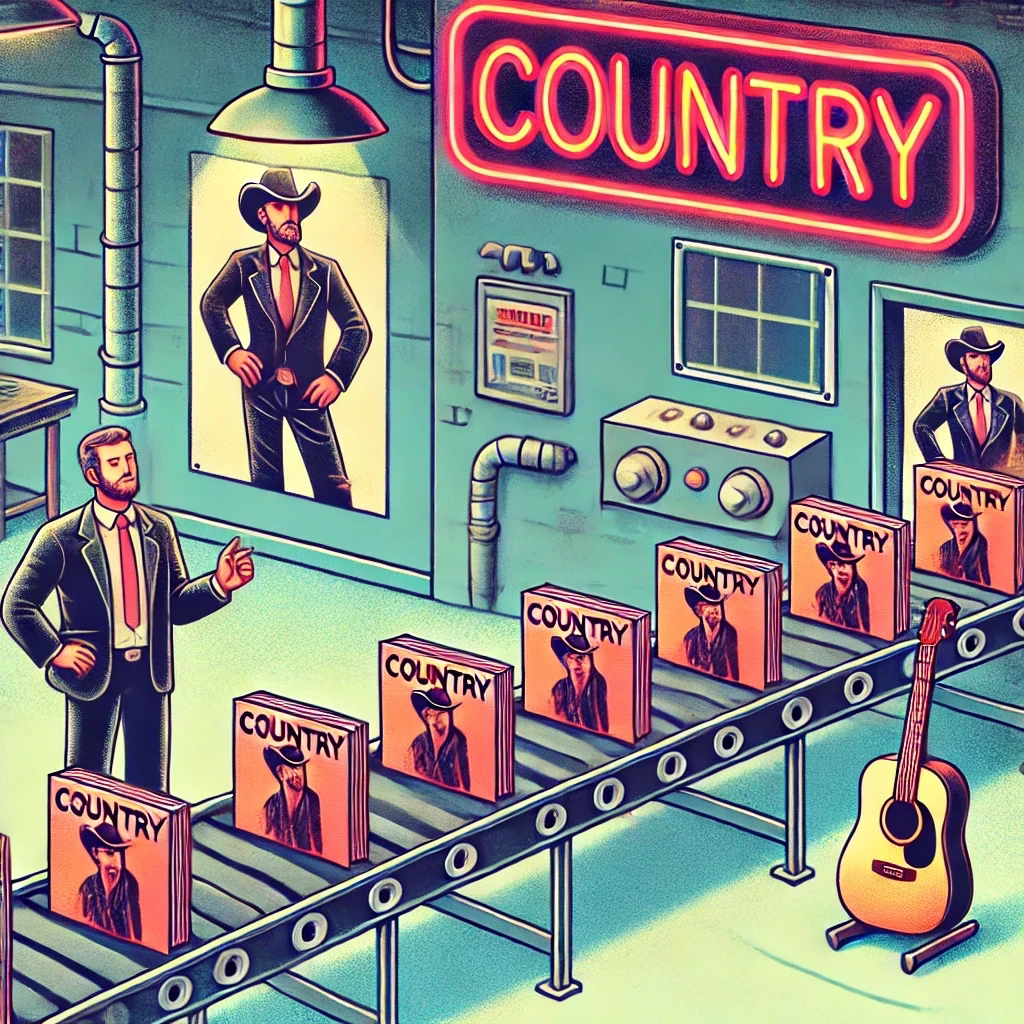The Nashville Music Factory: A Conveyor Belt of Manufactured Mediocrity
The Nashville Music Factory: A Conveyor Belt of Manufactured Mediocrity
Introduction
Nashville used to be a place where legends were made. It was where you could walk into a dive bar and hear someone who could outplay and outwrite half the industry. Now? It’s an assembly line. A machine designed to pump out safe, market-friendly, mass-consumable music that looks like country, sounds like pop, and has all the soul of a corporate jingle.
Sure, there are still artists keeping the spirit alive, but they’re buried under a pile of industry-approved, committee-written fluff. The real country music—the kind with grit, heart, and truth—is fighting for air while executives churn out another radio hit about dirt roads, beer, and the same four chords.
And now, they’re not even pretending to care about authenticity anymore.
---
I. The Corporate Hijacking of a Musical Legacy
There was a time when Nashville nurtured artists instead of manufacturing them. Johnny Cash, Willie Nelson, Waylon Jennings—they had to fight for their sound. They pushed against the system and made music that stood the test of time.
Today, the labels aren’t looking for pioneers; they’re looking for influencers. They don’t need someone with a unique voice—they need someone who looks good on a streaming thumbnail. The music has become an accessory to the brand, not the other way around.
Songwriting? Outsourced to the same five people in a handful of Nashville offices. Production? Cookie-cutter templates designed for maximum radio play. Sound? Whatever is trending on TikTok this month.
The end result? A bunch of plastic “country” songs that feel as genuine as a Walmart cowboy hat.
---
II. The “This Ain’t Country” Problem
Country music has always evolved, but there’s a difference between natural growth and corporate bastardization. What started as a storytelling genre about real-life struggles has been reduced to tailgates, Daisy Dukes, and generic feel-good anthems that have nothing to do with the country way of life.
Bro-country was bad enough—dudes in designer jeans singing about pickup trucks they probably don’t even own—but now, even that feels like it had more character compared to the watered-down, genre-blurred mess we’re dealing with today.
And now, the industry’s willingness to redefine country music has gone a step further. At the 2025 Grammys, Beyoncé won Best Country Album for Cowboy Carter, making her the first Black woman to do so. If the goal was to honor great country songwriting, that’s one thing. But let’s not pretend this wasn’t also about making a statement. Meanwhile, artists like Tyler Childers—who has been writing some of the most compelling country music in years—are still being largely ignored by the industry machine.
This isn’t about gatekeeping. It’s about priorities. When major awards are given out based on industry politics rather than artistic merit, it makes it clear that Nashville’s mainstream isn’t about the music anymore—it’s about branding.
---
III. The Genre-Blurring Grift: “Country Rap” and Other Frankenstein Experiments
Look, mixing genres isn’t inherently bad. Johnny Cash pulled from rock and blues. Willie Nelson’s Red Headed Stranger was basically a folk album. But the difference was, they weren’t trying to chase trends—they were making something honest.
Now? The labels are just throwing ingredients in a blender and calling it “progress.”
Country-rap? Manufactured nonsense. The same Nashville machine that used to mock hip-hop is now pasting trap beats onto banjos because it sells. Bro-country took over the charts, then pop-country, now we’ve got whatever this hybrid mess is supposed to be. It’s all just a desperate attempt to stay relevant rather than create something that is relevant.
Nashville isn’t leading music—it’s reacting to whatever’s already hot and trying to slap a cowboy hat on it.
---
IV. The Indie Underground: Where the Real Music Lives
If you’re looking for actual country music, the mainstream isn’t where you’ll find it. The best artists today aren’t the ones winning big at the CMAs—they’re the ones Nashville refuses to back because they don’t fit the mold.
Guys like Sturgill Simpson and Tyler Childers had to go around the machine because they knew it was rigged. Childers, for example, has deliberately avoided Nashville, saying that staying away allows him to produce more genuine music. Meanwhile, Simpson has been blunt about his disdain for the industry's commercialism, choosing to explore diverse musical styles rather than conform.
The underground is where country music still has a soul. It’s in the honky-tonks, the backyard shows, the self-produced records that don’t fit the radio’s algorithm. It’s the outlaw spirit that refuses to be repackaged.
---
V. Why This Matters: The Cultural Cost of Manufactured Music
This isn’t just about complaining that modern country music sucks—it’s about the bigger picture.
When an industry cares more about branding than music, the art suffers. When labels prioritize what’s marketable over what’s meaningful, we lose an entire generation of potential storytellers.
And when a genre that used to be built on truth and struggle is reduced to a marketing gimmick, the people who actually live those stories get pushed aside.
Music should be about connection. It should be about truth. And if Nashville keeps treating it like a product instead of an art form, it’s going to lose whatever credibility it has left.
---
Conclusion: Calling It Like It Is
Nashville isn’t dead. There are still great artists out there making real country music. But the mainstream industry? It’s a joke.
It’s a conveyor belt of manufactured authenticity, a collection of auto-tuned pretty faces playing pretend. It’s an industry more interested in selling a lifestyle than telling a story.
But here’s the thing: You don’t have to buy into it. Dig deeper. Seek out the real. Stop feeding the machine. Because as long as people keep lapping up whatever Nashville decides to slap a label on, the cycle continues.
It’s time to stop settling for the music industry’s idea of country and start supporting the artists who actually live it.


Comments
Post a Comment